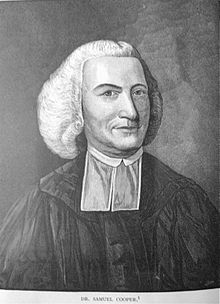
The 5th Day of Christmas: Samuel Cooper on the Articles of Confederation and peace on earth (1780)
Found in: Political Sermons of the American Founding Era. Vol. 1 (1730-1788)
The Massachusetts clergyman Samuel Cooper (1725-1783) gave a patriotic sermon in 1780 to celebrate the adoption of the Articles of Confederation. He concludes by urging his listeners to help build “the new city” in America by making the wilderness fruitful, inviting the injured and oppressed to come to America, and to create a country which “breaths” the principles of “peace on earth, and good will towards men”:
Religion & Toleration
Our mountains, our rivers and lakes have a singular air of dignity and grandeur. May our conduct correspond to the face of our country! At present an immense part of it lies as nature hath left it, and human labour and art have done but little, and brightened only some small specks of a continent that can afford ample means of subsistence to many, many millions of the human race. It remains with us and our posterity, to “make the wilderness become a fruitful field, and the desert blossom as the rose”; to establish the honour and happiness of this new world, as far as it may be justly our own, and to invite the injured and oppressed, the worthy and the good to these shores, by the most liberal governments, by wise political institutions, by cultivating the confidence and friendship of other nations, and by a sacred attention to that gospel that breaths “peace on earth, and good will towards men.” Thus will our country resemble the new city which St. John saw “coming down from God out of heaven, adorned as a bride for her husband.” Is there a benevolent spirit on earth, or on high, whom such a prospect would not delight?